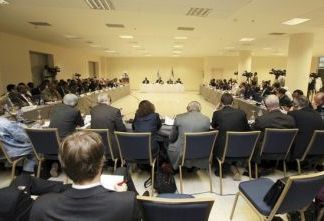Sudan urged to protect citizenship rights regardless of referendum outcome
November 10, 2010 (KHARTOUM) – An international consultative meeting on Sudan has urged leaders in north and south of the country to ensure that the citizenship rights of Sudanese people are not affected by the January 2011’s vote on south Sudan secession regardless of its outcome.

The run-up to the vote, whose likely result is the secession of south Sudan, has been marred with concerns on whether southerners in the north or northerners in the south will continue to enjoy full citizenship rights.
The final communiqué of the second meeting of Sudan Consultative Forum (SCF), which was held November 06 in the Ethiopian capital Addis Ababa in the presence of international and regional partners, said the participants had “drew particular attention to the issue of citizenship rights and the importance of ensuring that the people of the Sudan do not suffer any abrogation of human rights during or after the referendum on self determination.”
The meeting was co-chaired by the African Union (AU) Commissioner for Peace and Security, Ambassador Ramtane Lamamra, and the United Nations (UN) Under Secretary-General for Peacekeeping Operations, Mr. Alain Le Roy.
It was attended by representatives of Sudan’s neighboring countries as well as representatives of the permanent members of the UN Security Council.
The meeting’s final communiqué seen by Sudan Tribune said that the meeting had listened to presentations by the CPA signatories and received briefings by Special Representative of the UN Secretary-General for UNMIS, the AU-UN Joint Special Representative for UNAMID and the AU-UN Deputy Joint Chief Mediator for Darfur.
It also received a briefing from the Chairperson of the AU High-Level Implementation Panel (AUHIP) on Sudan.
The meeting said it had called on south Sudan government and north Sudan to release pledged funds to accelerate the progress of the referendum.
Preparations for the referendum have proceeded haltingly amid great logistical and technical obstacles. The head of the body tasked with organizing the plebiscite said that holding it on time would be like “a miracle.”
Another vote is supposed to take place also in January 2011 in the oil-producing area of Abyei, which lies on north-south borders, to decide whether it should stay with the north or join the south.
But the chances of that vote happening on time have been greatly reduced as north and south Sudan remain hopelessly deadlocked over whether the cattle herders of Al-Missiryah, who are associated with north Sudan, can vote in the referendum together with south Sudan’s tribe of Dinka Ngok.
The majority of Al-Missiriyah are not permanent residents in Abyei but only travel to the area few months a year to graze their cattle.
The SCF voiced concerns about the difficulties encountering efforts to break the Abyei deadlock, calling on both parties “spare no effort in seeking a holistic solution to the Abyei issue consistent with agreements entered into and the rights and interests of the communities that reside in and utilize the resources of Abyei.”
On Darfur, the meeting said it was regretting the boycotting of Darfur peace talks by the main rebel groups, namely the Justice and Equality Movement and the Sudan Liberation Movement of Abd-al-Wahid Muhammad Nur. It warned both factions of the “negative consequences” for them if they fail to participate “immediately” in the talks.
Furthermore, the meeting expressed “deep concern” over lack of security in Darfur and urged the parties there to cooperate fully with the UN-AU Hybrid Peacekeeping Mission in Darfur (UNAMID) to carry out its mandate.
The conflict in Darfur broke out on a massive scale in 2003 when rebels belonging mostly to African ethnicities took up arms against the Sudanese government, accusing it of marginalizing the region and demanding autonomy for the region.
Khartoum mobilized its allied Arab militias to carry out an abusive counterinsurgency which killed as many as 300.000 people and displaced 2 millions, according to UN figures. Khartoum disputes the death toll, putting it only at 10.000.
(ST)

Akuma
Sudan urged to protect citizenship rights regardless of referendum outcome
Citizenship can never be lost, but they will be protected upon the rules and laws of the nation. Korea, Somalia, and others nations are seperated but they still keep their citizenship.
South or North Sudan would not lose it citizenship.
Dr. AKuma